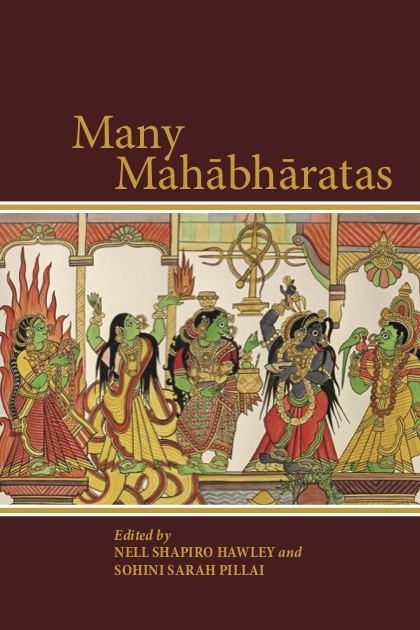The Institute for South Asia Studies at UC Berkeley invites you to a conversation around the newly published Many Mahābhāratas, a major contribution to the study of South Asian literature, offering a landmark view of Mahābhārata studies.
Panelists include
Editor: Sohini Sarah Pillai, Ph.D. Candidate, Dept. of South and Southeast Asian Studies, UC Berkeley
Editor: Nell Shapiro Hawley, Preceptor in Sanskrit, Dept. of South Asian Studies, Harvard University
Contributing Author: Robert P Goldman, Catherine and William L. Magistretti Distinguished Professor of Sanskrit, Dept. of South and Southeast Asian Studies, UC Berkeley
Contributing Author: Sally J. Sutherland Goldman, Senior Lecturer - Sanskrit, Dept. of South and Southeast Asian Studies, UC Berkeley
During the Q&A session, the panelists will be joined by these additional contributing authors:
Amanda Culp, Adjunct Professor of Drama, Vassar College
Eva De Clercq, Associate Professor of Indian language and culture, Ghent University
David Gitomer, Associate Professor of Religious Studies, DePaul University
Harshita Mruthinti Kamath, Assistant Professor in Telugu Culture, Literature, and History, Emory University
Sucheta Kanjilal, Assistant Professor of English and Writing, University of Tampa
Sudipta Kaviraj, Professor of Middle Eastern, South Asian and African Studies, Department of Middle Eastern, South Asian and African Studies, Columbia University
Timothy Lorndale, PhD Candidate, South Asia Studies, University of Pennsylvania
Philip Lutgendorf, Professor Emeritus of Hindi and Modern Indian Studies, University of Iowa
Ahona Panda, Humanities Teaching Fellow, South Asian Languages and Civilizations, University of Chicago
Heidi Pauwels, Professor in the Department of Asian Languages and Literature, University of Washington in Seattle
Paula Richman, Professor Emerita of South Asian Religions, Emerita, Oberlin College
Simon Winant, PhD Student, Ghent University.
_________________
DATE: Tuesday, February 23, 2021
TIME: 9am Berkeley | 5pm London | 10pm Lahore | 10:30pm New Delhi | Calculate Your Local Time
This event will also be live streamed on the Institute's FB page: ISASatUCBerkeley
_________________
About the book
Many Mahābhāratas is an introduction to the spectacular and long-lived diversity of Mahābhārata literature in South Asia. This diversity begins with the Sanskrit Mahābhārata, an early epic poem that narrates the events of a catastrophic fratricidal war. Along the way, it draws in nearly everything else in Hindu mythology, philosophy, and story literature. The magnitude of its scope and the relentless complexity of its worldview primed the Mahābhārata for uncountable tellings in South Asia and beyond. For two thousand years, the instinctive approach to the Mahābhārata has been not to consume it but to create it anew.
The many Mahābhāratas of this book come from the first century to the twenty-first. They are composed in nine different languagesApabhramsha, Bengali, English, Hindi, Kannada, Malayalam, Sanskrit, Tamil, and Telugu. Early chapters illuminate themes of retelling within the Sanskrit Mahābhārata itself, demonstrating that the storys propensity for regeneration emerges from within. The majority of the book, however, reaches far beyond the Sanskrit epic. Readers dive into classical dramas, premodern vernacular poems, regional performance traditions, commentaries, graphic novels, political essays, novels, and contemporary theater productionsall of them Mahābhāratas.
Because of its historical and linguistic breadth, its commitment to primary sources, and its exploration of multiplicity and diversity as essential features of the Mahābhāratas long life in South Asia, Many Mahābhāratas constitutes a major contribution to the study of South Asian literature and offers a landmark view of the field of Mahābhārata studies.
_________________
Like us on FACEBOOK
Follow us on TWITTER
The event is FREE and OPEN to the public.

